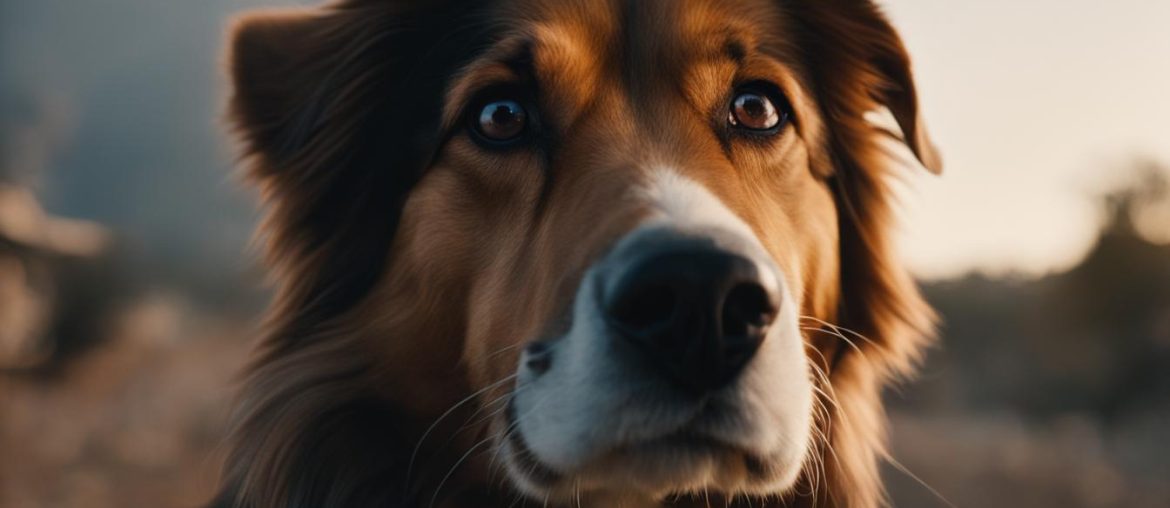Dogs are known for their unique behaviors and forms of communication, and one behavior that often leaves owners curious is when their dogs rub their faces on them. This seemingly affectionate gesture can have multiple meanings and motivations behind it. Understanding why your dog engages in this behavior can help strengthen your bond and improve your dog-owner interaction.
Key Takeaways
- Face rubbing in dogs is a form of canine affection and communication.
- Dogs may nuzzle to establish ownership by marking their owners with their scent.
- Face rubbing can be a sign of empathy and comfort when their owners are feeling down.
- Avoid hugging or cuddling dogs, as it can make them feel anxious or stressed.
- Respond to your dog’s nuzzling with gentle pats or offer treats as a form of positive reinforcement.
The Root of the Behavior
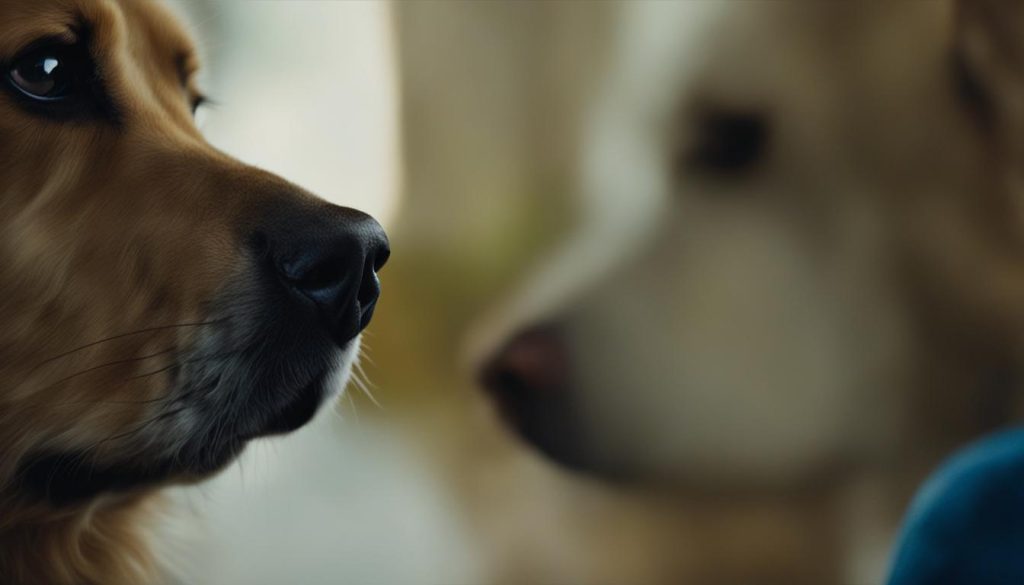
The behavior of dogs nuzzling and rubbing their faces on their owners can be traced back to several underlying reasons. Dogs may nuzzle to establish ownership by marking their owners with their scent. This signaling to other dogs that the owner is claimed territory. Additionally, dogs may nuzzle to show empathy and comfort when their owners are experiencing negative emotions. This behavior is driven by the dog’s ability to sense and respond to their owner’s emotional state. Puppies also learn nuzzling as a pacifying behavior from their mother, as it provides comfort and security. As they grow up, they may continue to nuzzle their human owners as a way to maintain that bond.
Nuzzling behavior in dogs is deeply rooted in their natural instincts and their desire for social connection. Dogs are pack animals, and nuzzling serves as a way to strengthen social bonds within the pack. By nuzzling their owners, dogs are signaling their trust, affection, and desire for closeness. This behavior is also influenced by the dog’s evolutionary history, as wild canids often engage in similar behaviors to establish and maintain social hierarchies.
Please be aware that nuzzling behavior can vary from dog to dog and may have different motivations. While some dogs nuzzle primarily for affection and comfort, others may nuzzle as a display of dominance or to mark their territory. Understanding the root of your dog’s nuzzling behavior and the context in which it occurs can help you respond appropriately and foster a positive relationship with your furry companion.
Encouraging the Behavior
While nuzzling behavior is generally considered positive, it’s important to respond appropriately to your dog’s nuzzling. Experts advise against hugging or cuddling dogs, as it can make them feel anxious or stressed. Dogs have a natural instinct to run away from threats, and being hugged restricts their movement. Instead, it’s recommended to show affection through gentle pats or by offering treats. These forms of positive reinforcement can strengthen the bond between you and your dog without causing them stress or discomfort.
When your dog nuzzles you, it’s their way of seeking attention and showing affection. By responding with gentle pats or scratches on their favorite spots, you reinforce their behavior and let them know that you appreciate their affectionate gestures. It’s important to be consistent in your response to their nuzzling, so they understand what behavior is rewarded. Offering treats as a form of positive reinforcement can also be effective in encouraging desired behavior and strengthening the bond between you and your dog.
Avoiding hugging is crucial, as dogs have different comfort zones and personal boundaries. While some may tolerate being hugged, many dogs find it uncomfortable or even threatening. It’s important to respect your dog’s boundaries and show affection in ways that they enjoy. By avoiding hugging and instead using gentle pats or offering treats, you can ensure that your dog feels safe and loved.
Different Motivations for Nuzzling
Dogs exhibit nuzzling behavior for various reasons, and understanding these motivations can provide valuable insights into their communication and behavior. In some cases, nuzzling can be a sign of dominance in dogs. Dogs may nuzzle their owners’ faces as a way to assert their dominance and establish a hierarchy. This behavior is often accompanied by other dominant behaviors such as barking, obstructing paths, or mounting. It’s important to address this dominant nuzzling behavior through proper training and behavioral correction.
On the other hand, dogs may also nuzzle to show submission, particularly in interactions with other dogs. This is a way for them to demonstrate respect and deference. If your dog exhibits submissive nuzzling behavior, it’s essential to provide them with reassurance and create a safe and positive environment.
Identifying the underlying motivation behind your dog’s nuzzling behavior is crucial for addressing any potential issues and promoting positive interactions. By understanding the different reasons why dogs nuzzle, you can effectively communicate and build a stronger bond with your furry companion.
Nuzzling as a Sign of Dominance
Some dogs may nuzzle their owners as a sign of dominance. This behavior is often accompanied by other dominant behaviors and should not be encouraged. It’s important to establish clear boundaries and use positive reinforcement techniques to correct dominant nuzzling behavior. Working with a certified animal trainer can provide valuable guidance in addressing and modifying this behavior.
Nuzzling and Itching
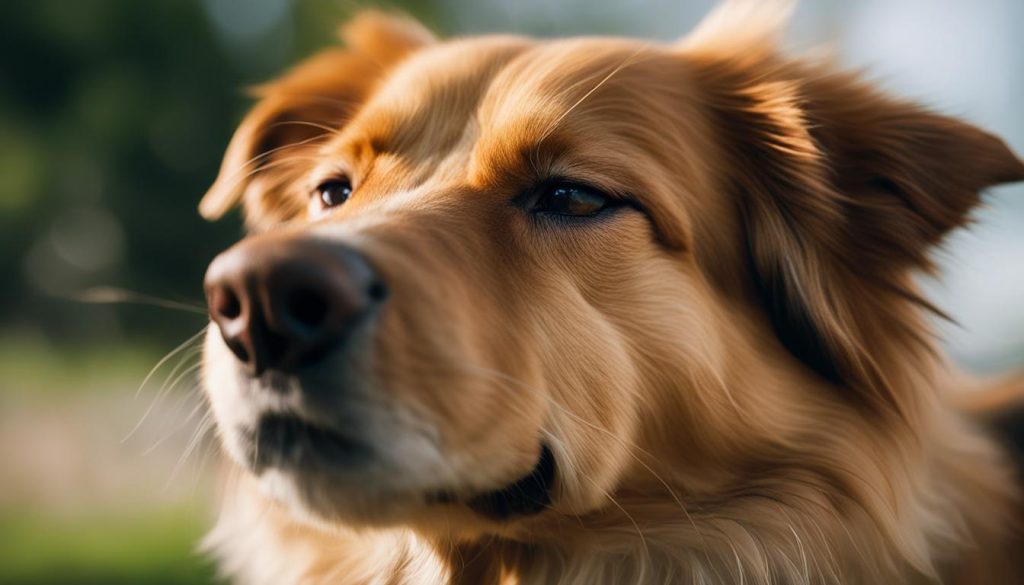
Itching is a common issue for dogs, and it can sometimes motivate them to nuzzle their owners. If your dog is experiencing itchiness or discomfort, they may rub their face against you as a way to alleviate the itch or use you as a scratching post. It’s important to identify the underlying cause of the itchiness, which can range from flea infestations to allergies or skin irritations. Consulting with a veterinarian can help address your dog’s itching and find appropriate treatments or preventive measures.
When your dog nuzzles you due to itching, it’s crucial to address the root cause rather than simply tolerating the behavior. Itching can be uncomfortable and distressing for your dog, and finding effective solutions can improve their quality of life. A veterinary professional can conduct tests and examinations to determine the cause of the itching and recommend appropriate interventions, such as medicated baths, dietary changes, or medications to alleviate the symptoms and promote healing.
| Possible Causes of Itching in Dogs | Suggested Treatments |
|---|---|
| Flea infestation | Regular flea prevention treatments, flea baths, and environmental control |
| Allergies | Identify and avoid allergens, allergy medications, immunotherapy |
| Skin infections | Antibiotics, antifungal medications, medicated shampoos |
| Dry skin | Moisturizing shampoos, omega-3 fatty acid supplements, humidifiers |
Remember that addressing itchiness in dogs goes beyond providing temporary relief. It involves identifying and treating the underlying cause to ensure long-term comfort and well-being for your furry friend. By taking a proactive approach and seeking guidance from a veterinarian, you can help your dog find relief and reduce their need for nuzzling as a way to alleviate itching.
Nuzzling as a Cleaning Behavior
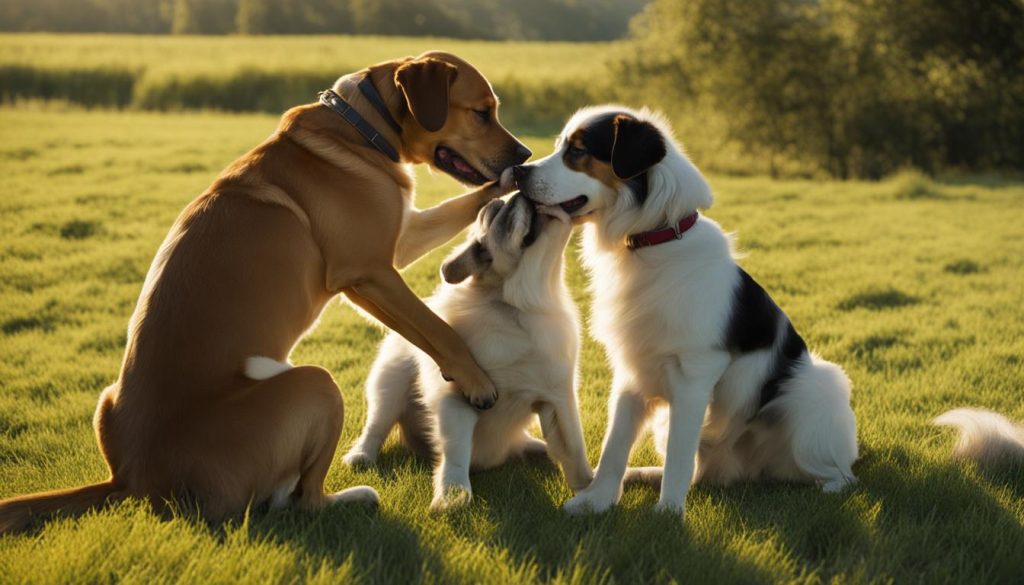
Dogs have a natural grooming instinct, and they may use their owners as a way to clean themselves. If your dog rubs their face on you after eating or drinking, it could be a way for them to clean their face. Dogs may lick their paws, rub their faces against furniture or other objects, and then nuzzle their owners. This behavior helps them keep their faces clean and free from any food or drink residue. Please be aware that this behavior is natural and should be accepted as part of your dog’s grooming routine.
| Benefits of Nuzzling as a Cleaning Behavior | Considerations |
|---|---|
|
|
“When dogs nuzzle their owners, it’s a sign that they care and want to provide emotional support.”
While nuzzling can be a hygienic behavior for dogs, it is important to consider some considerations. Nuzzling may transfer dirt or bacteria from their faces to their owners’ clothes, so it’s advisable to have a clean towel or a designated spot for your dog to clean themselves. Additionally, nuzzling can be messy, especially if your dog has a wet or dirty face. If you have allergies or sensitivities, you may need to take extra precautions or discuss this behavior with your veterinarian to find the best solution for you and your dog.
Overall, nuzzling as a cleaning behavior is a natural and instinctual behavior for dogs. It allows them to maintain their cleanliness and remove any food or drink residue from their faces. While there may be some considerations to keep in mind, it’s important to recognize and accept this behavior as part of your dog’s grooming routine. By understanding and appreciating your dog’s natural instincts, you can foster a strong and loving relationship built on trust and care.
Affectionate Behavior in Dogs: Nuzzling for Bonding
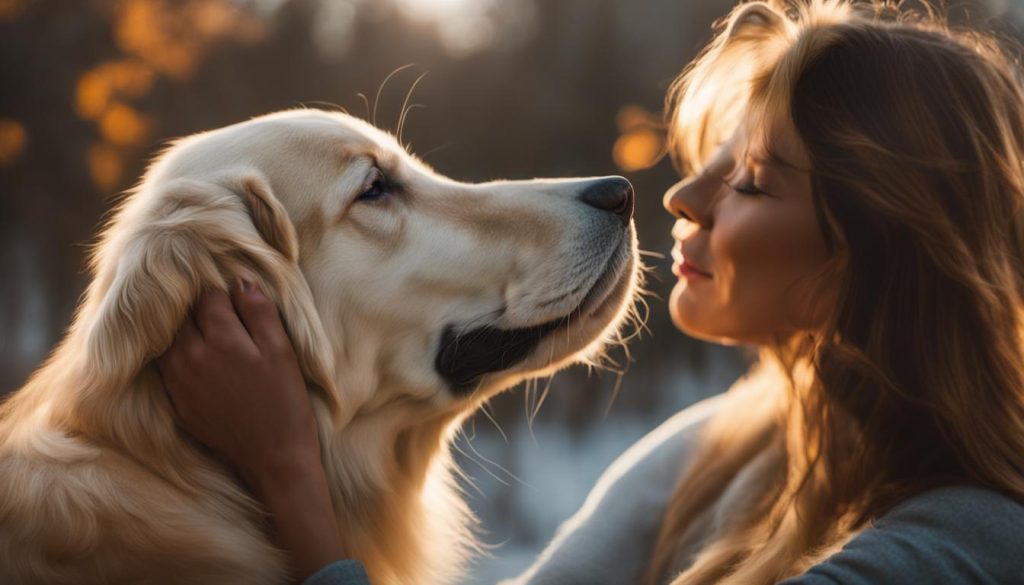
Dogs are known for their loving and affectionate nature towards their human companions. One of the ways they show their love is through nuzzling, a behavior where they rub their faces against their owners. Nuzzling is a powerful form of communication and bonding for dogs, as it allows them to express their affection and strengthen their connection with their owners.
When dogs nuzzle, it is often accompanied by other signs of affection, such as wagging tails, gentle nudges, and licking. These behaviors are all ways for dogs to show their love and to seek physical contact with their owners. Nuzzling can create a deep sense of trust and security between dogs and their human companions, fostering a strong and loving relationship.
During nuzzling, dogs may also release calming hormones, such as oxytocin, which enhances the bond between them and their owners. This hormone is often referred to as the “love hormone” and is associated with feelings of trust and attachment. So, when your dog nuzzles you, they are not only showing affection but also strengthening the emotional connection between you both.
Benefits of Nuzzling for Dogs and Their Owners
Nuzzling provides several benefits for both dogs and their owners. For dogs, it allows them to release stress and anxiety, as physical contact with their owners can have a calming effect on them. Nuzzling also helps dogs satisfy their grooming instincts, as they use their owners to clean their faces and remove any food or drink residue.
For owners, nuzzling is a heartwarming and joyous experience. It reinforces the bond they share with their dogs and provides a sense of comfort and reassurance. Nuzzling can also be a great stress reliever for owners, as spending time with their dogs and receiving their affectionate gestures can help reduce anxiety and improve overall well-being.
The Importance of Responding to Nuzzling
When your dog nuzzles you, it’s important to respond in a way that acknowledges their affection and strengthens the bond between you. This can include gentle pats, cuddles, and verbal affirmations. Avoid behaviors that may make your dog uncomfortable, such as picking them up or hugging tightly.
Every dog is unique, so pay attention to their individual preferences and boundaries. Some dogs may prefer shorter nuzzling sessions, while others may enjoy longer periods of physical contact. By respecting your dog’s needs and responding appropriately to their nuzzling, you can enhance the affectionate bond you share and create a loving and lasting relationship.
Nuzzling and Dominance in Dogs
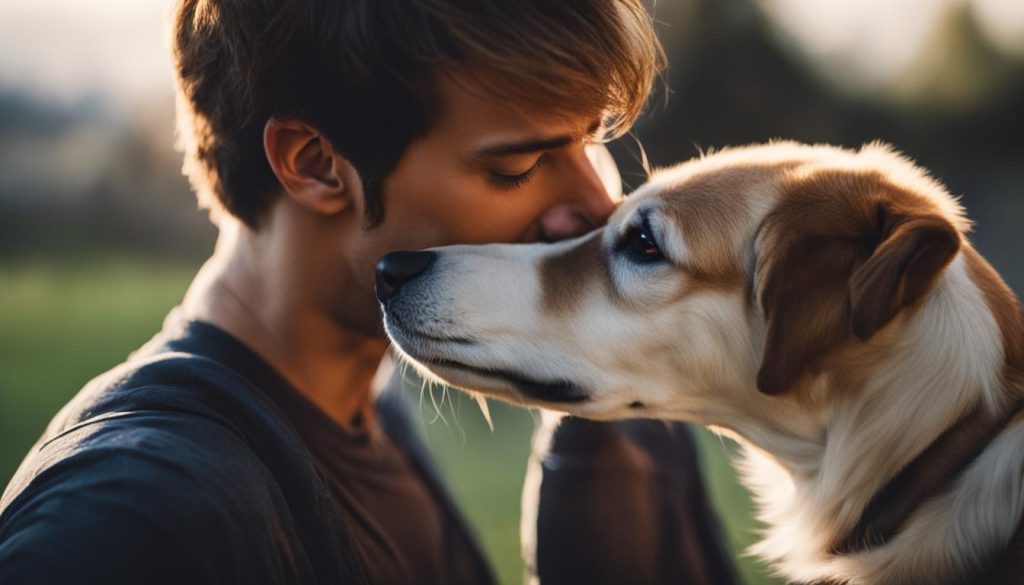
Dogs may nuzzle their owners as a sign of dominance, which can be accompanied by other dominant behaviors such as barking, obstructing paths, or mounting. This type of nuzzling is not considered appropriate and may require training to correct. Working with a certified animal trainer can help establish clear boundaries and promote more balanced and respectful interactions with your dog. It’s important to address dominant nuzzling behavior to ensure a harmonious relationship between you and your pet.
Establishing a hierarchy is essential in managing dominant behavior in dogs. By addressing dominant nuzzling, you can prevent potential aggression or other behavioral issues. It’s crucial to provide consistent rules and boundaries, reinforcing desirable behaviors and discouraging unwanted ones. Training techniques such as positive reinforcement, where you reward desired behaviors, can be effective in correcting dominant behavior. Remember to be patient and consistent throughout the training process, as it may take time for your dog to understand and adjust to the new expectations.
Correcting dominant behavior should focus on redirecting your dog’s attention and encouraging more appropriate ways of interacting with you. By providing mental and physical stimulation through activities such as training exercises, puzzle toys, or interactive play, you can help channel your dog’s energy and prevent unwanted dominant behaviors. It’s important to create a positive and nurturing environment that promotes mutual respect and trust between you and your furry companion.
Correcting Dominant Nuzzling: Tips and Techniques
Here are some tips and techniques to address dominant nuzzling behavior in dogs:
- Work with a certified animal trainer or behaviorist who specializes in dog behavior to create a tailored training plan for your dog’s specific needs.
- Set clear boundaries and rules that help establish a hierarchy within your household. Consistency is key in reinforcing these boundaries.
- Use positive reinforcement techniques, such as rewarding your dog for calm and submissive behavior, to encourage desirable behavior and discourage dominant nuzzling.
- Provide mental and physical stimulation through activities, exercise, and interactive toys to help redirect your dog’s energy in a positive way.
- Avoid scenarios or triggers that may elicit dominance, such as allowing your dog to sleep on your bed or engage in rough play. Instead, create a calm and structured environment.
By implementing these techniques and working patiently with your dog, you can correct dominant nuzzling behavior and foster a healthy and balanced relationship.
Nuzzling and Empathy: Understanding Dogs’ Comforting Behavior
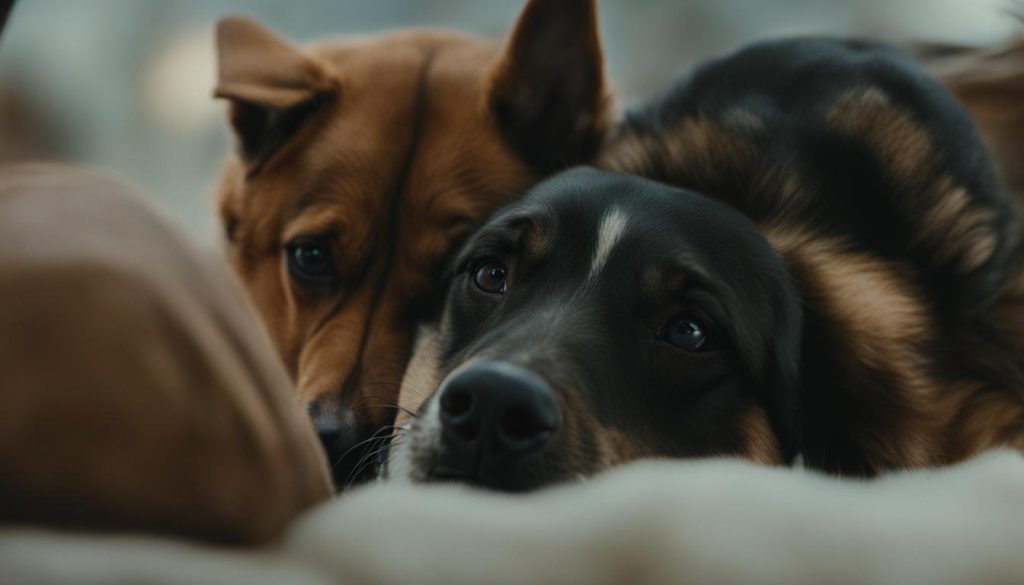
One of the most remarkable aspects of our canine companions is their ability to sense and respond to our emotions. When a dog nuzzles their owner, it is often a display of empathy and a sincere effort to provide comfort and support. Dogs have an innate understanding of human emotions, and they use physical contact, such as nuzzling, as a means of connection and reassurance.
Research has shown that dogs can differentiate between different emotional states in humans, responding with gestures of affection and empathy. When we are feeling down or distressed, our dogs may approach us, gently nuzzle their faces against ours, and offer a calming presence. This behavior is driven by their genuine concern for our well-being, rather than selfish desires for attention or affection.
Interactions with our dogs during moments of emotional vulnerability can be immensely beneficial for our mental and emotional well-being. The comforting behavior exhibited by dogs when they nuzzle us can help alleviate stress, reduce anxiety, and provide a sense of connection and support. It is a beautiful testament to the deep bond that can be formed between humans and their canine companions.
The Power of Nuzzling in Animal-Assisted Therapy
The empathetic nature of dogs and their comforting behavior through nuzzling has made them invaluable partners in various forms of therapy, such as animal-assisted therapy. In these settings, specially trained dogs provide emotional support and companionship to individuals facing challenging circumstances. Through their gentle nuzzles, dogs can help alleviate feelings of loneliness, anxiety, and depression, promoting a sense of well-being and emotional healing.
| Benefits of Nuzzling in Animal-Assisted Therapy | Examples |
|---|---|
| Reduces stress and anxiety | A dog nuzzling a patient, providing comfort and a sense of security during a therapy session. |
| Promotes emotional connection | A dog nuzzling a resident in a nursing home, fostering a sense of companionship and reducing feelings of isolation. |
| Enhances mood and uplifts spirits | A dog nuzzling a child, creating a joyful and positive environment during a therapy session. |
These examples illustrate the remarkable impact that dogs’ nuzzling behavior can have on individuals in need of emotional support. Their ability to sense and respond to human emotions, coupled with their comforting nuzzling gestures, makes them valuable allies in the field of therapy.
Nuzzling as Territory Marking
Dogs have scent glands in their faces, and when they nuzzle their owners, they may be marking them with their scent as a form of territorial behavior. By marking their owners, dogs send a signal to other dogs to keep away and establish that the owner is claimed territory. This behavior is instinctual and helps dogs communicate boundaries and protect their owners. Understanding the role of scent marking in nuzzling can provide insights into the complex world of dog communication.
Nuzzling as territory marking is a natural behavior in dogs that serves as a way for them to establish ownership and assert their boundaries. Dogs use their scent to communicate their presence and to ward off potential intruders. When a dog rubs their face on their owner, they are leaving their scent, which acts as a territorial marker. This behavior can be seen as a protective instinct, as dogs are marking their owner as their territory and warning other dogs to stay away.
To better understand this behavior, imagine a dog in the wild marking their territory with urine. The same concept applies when a dog nuzzles their owner. It’s their way of saying, “This person belongs to me.” While it may seem odd to us humans, this behavior is deeply ingrained in a dog’s instincts and is a way for them to establish their place in the pack hierarchy.
It’s important for dog owners to understand and respect their dog’s need for territory marking through nuzzling. By allowing dogs to engage in this behavior, we are acknowledging their natural instincts and promoting a sense of security and comfort for them. However, it’s also essential to set boundaries and provide clear training to prevent any aggressive behaviors associated with territorial marking. A trained and well-socialized dog will understand when it’s appropriate to engage in nuzzling as territory marking and when it’s not.
Wrapping Up
To summarize, dog nuzzling is a behavior that serves various purposes and holds different meanings. It can be a powerful display of affection, allowing dogs to communicate their love and strengthen their bond with their owners. Through nuzzling, dogs seek physical contact and create a sense of security and trust in the relationship.
Additionally, nuzzling can also be a form of communication, where dogs express their needs, wants, or empathy towards their owners. Dogs have the ability to sense and respond to their owners’ emotions, providing comfort and support during times of distress.
While nuzzling is generally a positive behavior, it’s important for dog owners to respond appropriately. Avoid behaviors such as hugging, which may cause discomfort or stress to dogs. Instead, show affection through gentle pats or offer treats as a form of positive reinforcement.
By understanding the motivations behind dog nuzzling and fostering a loving and respectful relationship, dog owners can create a harmonious companionship and enjoy the many rewards of bonding with their furry friends.
FAQ
Why does my dog rub his face on mine?
Dogs may rub their faces on their owners as a way to establish ownership, show empathy and comfort, or communicate their needs and wants.
What is the root of this behavior?
Dogs nuzzle to establish ownership by marking their owners with their scent. They also nuzzle to show empathy and comfort, and puppies learn nuzzling as a pacifying behavior from their mother.
How should I respond to my dog’s nuzzling?
It’s important to respond appropriately to your dog’s nuzzling and avoid behaviors like hugging that dogs may find uncomfortable or stressful. Show affection through gentle pats or by offering treats instead.
Are there different motivations for nuzzling?
Yes, dogs may nuzzle as a sign of dominance, submission, to address itching, or as a cleaning behavior.
How can I address dominant nuzzling behavior?
Dominant nuzzling behavior should be addressed through proper training and behavioral correction. Working with a certified animal trainer can help establish clear boundaries and promote more balanced interactions.
Why do dogs nuzzle when they are itchy?
Dogs may rub their faces on their owners to alleviate itchiness or use them as a scratching post. Identifying the underlying cause of itchiness is important and consulting with a veterinarian is recommended.
Why do dogs use their owners to clean themselves?
Dogs have a natural grooming instinct and may rub their faces on their owners to clean themselves after eating or drinking. This behavior helps them keep their faces clean and free from any food or drink residue.
Is nuzzling a sign of affection?
Yes, nuzzling is often a sign of affection and a way for dogs to strengthen their bond with their owners. Dogs enjoy being close to their owners and seek physical contact as a way to express their love and comfort.
How can I promote positive interactions when my dog nuzzles?
Foster a loving and respectful relationship with your dog by understanding their motivations and responding appropriately to their nuzzling. Use gentle gestures and avoid behaviors that may cause discomfort or stress.
Why do dogs mark their owners with scent through nuzzling?
Dogs have scent glands in their faces, and by nuzzling their owners, they mark them with their scent as a form of territorial behavior. This helps communicate boundaries to other dogs and protects their owners.
What is the significance of dog nuzzling in bonding?
Dog nuzzling helps strengthen the bond between dogs and their owners. It creates a sense of security, trust, and love. By recognizing and appreciating this form of communication, a strong and loving relationship can be developed.


